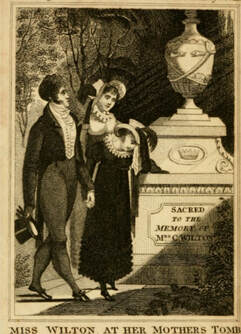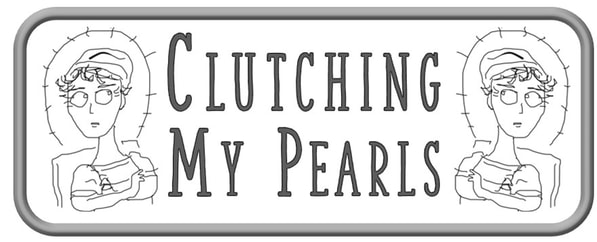| Clutching My Pearls is an exploration of Jane Austen's art, her times, and her beliefs. Click here for the first in the series. Can traces of Austen be found in the works of other authors? For more on now-obscure authoresses of Austen's time, click on the "Authoresses" category on the right-hand menu. |
 Explicitly Christian message
Explicitly Christian message And, one of the main characters is a Mr. Austen, a widower who is raising his daughter with the help of a governess. Naturally I wondered if this was a posthumous tribute to Jane Austen.
Ostentation and Liberality is a didactic book aimed at young people and/or their parents. The central conflict is the governess’s efforts to raise her pupil to be virtuous and good. Will Frances grow up to be like her frivolous, heartless, cousins, or will she emulate Miss Colville’s former pupil, the benevolent Lady Jane? A young man is introduced into the narrative, but there is no romance.
Arabella Argus is a pseudonym. We don’t know the author's life dates because we don’t know who Arabella Argus was. We don't even know if Argus was a female, or one person. Her books were published and re-issued between 1810 and 1835, according to the Women's Print History Project. “Argus” is a reference to a figure from Greek mythology, an all-seeing giant covered with eyes.
If you're an Austenite, read on to see if you can spot some Emma similarities in this book...
I’m becoming increasingly interested in the question: when did certain narrative techniques arise in the development of the novel? When did novelists dispense with introducing their characters to the audience and start sprinkling expository information throughout the novel?
For example, five of the six Jane Austen novels begin, like most novels of her time, with a brief curtain-raiser about the main character or characters. We learn that Catherine Morland’s father is a clergyman, Emma’s father is wealthy and widowed, Sir Walter is a vain baronet, the Dashwoods are a respectable family, and one of the three Ward sisters was lucky to marry a baronet.
The exception is Pride and Prejudice which, after its famous opening line, goes into a conversation between a husband and wife about the new neighbour. We learn a lot more about the family but it is not placed right up front in narration. We don't learn about the entail on the Bennet property until Chapter 13!
This distinction was brought home to me when I started reading The Bristol Heiress. I accidentally began with Volume III instead of Volume I. "Wow," I thought to myself, "this author is really ahead of her time. She’s starting with a conversation between the heroine and her dissolute, debt-ridden aunt, whose affairs have reached a crisis point. Instead of describing who everybody is, what their social standing is and how much money they have, she’s starting the story in medias res, (to use the literary term)."
However, I soon discovered my mistake, and went back to Volume I, which in fact, started in the conventional way: “Mr. Percival was the only surviving branch of a genteel, but not opulent family…”
 Unconventional opening with dialogue
Unconventional opening with dialogue I expected the author to circle back and tell us more about the backstory of the family and even the backstory of the governess, because she is a central character in the book. But we don't get their financial or social histories at all, except that they are obviously well off, and the governess, Miss Colville, is distantly related to a respected general. Perhaps this is because the characters aren't really important; they are just walking, talking points of view designed to put certain moral lessons across. Austen, of course, made her characters come alive.
There’s one other stylistic point, which is the use of reported speech (that is, speech with a tense shift from "I am not hungry" to "He was not hungry") presented in quotation marks as though it were dialogue. Austen does this, very occasionally. Here are some examples:
“No—he should not eat. He was not hungry; it would only make him hotter.” [Emma]
“To have it quite in their own family circle was what they had particularly wished. A stranger among them would have been the destruction of all their comfort.” [Mansfield Park]
Auger is the only other author I've noticed using this technique, though no doubt there are others. I have never found a scholarly discussion of this type of reported speech in dialogue quotation marks, although surely in the vast corpus of Austen scholarship, somebody has discussed it. Nor have I found a name for this literary technique. [[Update: I've learned from Jan Fergus's book on Austen that this technique is called "free indirect speech," a term I confused with "free indirect discourse."]]
At any rate, here is one of two examples from Ostentation and Liberality: “The air was chilly; they hoped Frances did not think of finishing her sketch that day; their mamma would be lonely; and they begged a servant might order their carriage.”
This technique is used very seldom. I just can't figure out why Austen and Argus choose to use it for certain passages. This reported speech from Mrs. Clay about rain in Persuasion is not encased in quotation marks: she would hardly allow it even to drop at all, and her boots were so thick! much thicker than Miss Anne's; but other bits of indirect speech are in quotation marks. Why? I've no idea. [Fergus calls this, "indirect speech without quotation marks]].
 In the movie, of course, but not the book
In the movie, of course, but not the book Both the governess and the father are the lecture-giving moral arbiters of the book, and in addition, the writer often breaks in with her own lengthy lectures.
How to educate daughters properly is a recurring theme. Mr. Austen argues with Marian’s mother about whether girls should study serious subjects. Mrs. Wilton is a vain and unpleasant woman, so we know that the author does not agree with her character when she says: “There is something vastly unfeminine in a girl’s professing a predilection for studies that belong exclusively to the other sex. No, it is not the study of algebra or geometry that I would wish your daughter to pursue; --she must be a musician, an artist, a linguist; and the accomplishments of dancing must not be omitted.”
Dad disagrees. He won't engage the most fashionable or expensive masters to train Frances. But on the other hand, he doesn’t think his daughter is particularly bright or talented academically (a remark he makes several times). Miss Colville is not working with a little prodigy of genius or virtue, she is just trying to do her best with an ordinary little girl.
Young Frances is tired of hearing about how great Lady Jane is. She complains that Lady Jane’s virtues are “constantly brought forward.” “Do I hear of any thing but Lady Jane’s talents, -- Lady Jane’s liberality, -- Lady Jane’s everything?” Frances is in danger of being influenced by her worldly, snarky, cousins who also resent their neighbour Lady Jane.
Cousin Marian is the Bad Example in the book. She is rude to Lady Jane and Miss Colville, and she even has bad table manners. She invites herself to a party when Frances is entertaining a friend: “’What excellent potatoes!’” the intruder exclaimed, taking one from a dish at some distance from her, and dipping it in the salt she had elegantly strewed upon the table-cloth.”
I presume they were boiled potatoes.
 Kindness to our social inferiors
Kindness to our social inferiors “A boy caricaturist can only excite the contempt of those he presumes to satirize; --at least, such would be the opinion of most persons upon this occasion. However, as one who knows the world, and has been accustomed to observe those rules of civil life which can alone enable man to live in fellowship with man, I warn you that this habit, if indulged, may lead to the commission of a crime of the deepest turpitude; --an insult of this nature, at a more advanced age, would expose you to a challenge from your equal in society; and, though it is not quite clear to me that the professed satirist is really a courageous person, he of all men should avoid such a contest. For of this I am assured, that whoever pursues a practise so void of liberality, must be deficient in those benevolent feelings, that just temper of mind, which can make a mere mortal regard the future with becoming humility.”
Could an eleven-year-old understand that the general is talking about dueling, death, and salvation?
Books like this do offer a valuable source of insight into the language, slang, and customs of the day. Marian laughs with astonishment when a vulgar and badly-dressed lady knocks at their front door. “Now here is an old quiz of a woman. Oh dear, she’s spying out the numbers. Is she a friend of yours, Frances? I cannot say much for her elegance. Hark—a double knock! Well, I declare I should have expected to have seen her go down the area.”
This tells us that there is a separate servants' entrance for the Austen's Harley Street residence and perhaps different knocks were used by the gentry and by tradesmen. Austen's characters Isabella and John Thorpe also used the term "quiz" in this derogatory way, to laugh at people's appearance. As it turns out, the vulgar Mrs. Cox is related to Marian, and not Frances. Marian is rude to her, which distresses her mother, because Mrs. Cox may be vulgar, but she's rich! She, like other minor characters, don't play a decisive role in the plot. There are put there to demonstrate moral lessons. And, there is barely any plot. Some people die, some repent.
 Harley Street Wiki Commons
Harley Street Wiki Commons Miss Colville corrects Frances's use of English as well as her morals and manners: she gets a little lecture on the correct use of the word ‘nice:’ “'For instance, Mrs. Wilton is rich, dresses well, and (of course), is never dirty: still, the word ‘nice’ can hardly apply to her appearance. She may be pleasing, agreeable, or elegant; but I do not see the fitness of calling her nice. Your cousins being ‘nice girls,’ is liable to the same objection.'” And—yes! Miss Colville lectures Frances on the difference between pride and vanity. That’s two novels in a row I’ve read that have somebody explaining the difference between pride and vanity.
The book bears little resemblance to Austen in terms of plot, tone, or literary merit, but can the name of "Austen" be a mere coincidence? Or is it a tribute from a fan to a favourite author?
Previous post: Sleath and Slavery Next post: The perils of petticoat government
| The Monthly Review said: "Some useful lessons may be learned from this tale; though even Miss Colville, the governess who is here represented as furnishing hints for moral improvement, is not always perfectly grammatical in her expressions." Although Miss Colville lectures the girls on proper English usage, the reviewer found fault with some of her expressions as well and also took exception to the use of "left" for "departed," calling it a "low servant's phrase." Arabella Argus wrote several books with animals as the main characters. The famous children’s classic Black Beauty “shares many actual scenes” with Argus’s 1815 story The Adventures of a Donkey, according to scholar Tess Cosslett. More, much more, on the topic of female education (and how it is the theme of Mansfield Park) in a series of posts starting here. |
| Cosslett, Tess. Talking Animals in British Children's Fiction, 1786-1914. Ashgate, 2006. Fergus, Jan, and Wood, J. Luke. Jane Austen: A Literary Life. United Kingdom, Palgrave Macmillan UK, 2016. Free indirect speech discussed on pps 96-97. |

 RSS Feed
RSS Feed